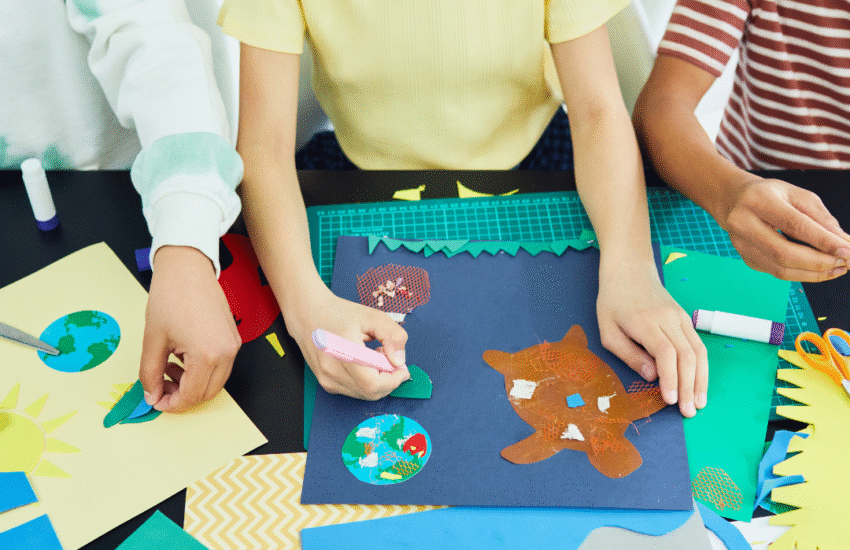How to Find a New Hobby: A Simple Guide to Discovering Your Passion
Finding a new hobby can be a fulfilling way to enrich one’s life and discover new passions. The key to finding a new hobby is to explore activities that align with personal interests and values while remaining open to trying new experiences. Engaging in various activities can lead to unexpected enjoyment and satisfaction.
It’s essential to consider what activities spark curiosity or excitement. Attending local community events, browsing online platforms, or joining clubs can provide inspiration. Reflecting on past interests or values can also guide individuals toward potential hobbies that resonate with them.
Ultimately, the process of exploring new hobbies should feel enjoyable and rewarding. Embracing this journey can lead to personal growth and a greater sense of fulfillment.
Understanding Your Interests
Identifying personal interests is a critical step in finding a new hobby. By reflecting on past experiences, recognizing strengths, and exploring new areas, individuals can uncover engaging pursuits that resonate with them.
Reflecting on Pastimes
Looking back at previous activities is essential. Individuals should consider what they enjoyed in their youth or past years. Was there a particular sport or craft that brought joy? They can make a list of past hobbies and note which ones felt the most fulfilling. For example, if pickleball was a favorite pastime, you can consider going for some custom pickleball paddles to renew the love for the sport. Personalized equipment can improve the experience, and help in bringing back the fulfillment it once did.
It’s also helpful to think about current interests. Reading genres, favorite films, or music preferences reveal underlying passions. This reflection can spark ideas for activities aligned with their personality. Keeping a journal to jot down thoughts may provide clarity over time.
Identifying Personal Strengths
Each person has unique strengths that lend themselves well to certain hobbies. Recognizing these strengths is vital in the hobby discovery process. Individuals should evaluate their skills, whether they’re good at creative pursuits, problem-solving, or physical activities.
Creating a simple list can aid in this assessment. Possible skills include:
- Communication
- Craftsmanship
- Analytical thinking
- Athletic abilities
By pinpointing these strengths, individuals can narrow down hobbies that may come naturally to them, leading to greater satisfaction and enjoyment.
Exploring New Subject Areas
Venturing into unfamiliar territory can open up exciting opportunities. Individuals are encouraged to explore subjects they may not have considered before, such as photography, cooking, volunteering, or even flight training. Attending an introductory class at a local flight school, like Nationwide Aviation and similar others, can offer a firsthand glimpse into the world of aviation. Online platforms, local programs, and community groups provide additional resources for discovering new interests.
Experimenting with different activities often leads to unexpected passions. Attending workshops or trying out classes is advisable. Even short-term commitments allow for exploration without overwhelming obligations. This approach fosters a mindset of curiosity and adaptability, enriching the search for a new hobby.
Setting Achievable Goals
Establishing clear and attainable goals is essential when exploring new hobbies. This process allows individuals to track their progress and stay motivated. Goals can be structured into short-term and long-term categories to provide a balanced approach.
Short-Term Hobby Objectives
Short-term objectives serve as the foundation for building new habits. These goals should be specific and realistic, focusing on small, actionable steps.
Examples include:
- Try a new class: Sign up for a beginner’s course in a hobby of interest.
- Set practice times: Allocate specific days of the week dedicated to the hobby.
- Complete a project: Focus on finishing one small project, such as knitting a scarf or painting a canvas.
By achieving these short-term goals, individuals gain confidence and reinforce their commitment to the new activity. Regularly reviewing progress can help maintain motivation and adjust objectives as needed.
Long-Term Hobby Milestones
Long-term milestones assist in making sustained commitments to hobbies. Goals in this category require more time and investment, promoting deeper engagement and skill development.
Consider these milestones:
- Participate in competitions: Join local events or challenges related to the hobby.
- Create a portfolio: Document progress and showcase projects, such as photography or craft work.
- Teach others: Share knowledge or skills, whether informally or through structured classes.
Establishing these longer-term goals encourages individuals to set benchmarks for their growth. Achieving these milestones can foster a sense of accomplishment and enhance enjoyment in pursuing the hobby.
Research and Inspiration
Exploring new hobbies requires thorough research and inspiration. Utilizing various resources can provide ideas and help individuals identify interests they may not have considered.
Utilizing Social Media Platforms
Social media platforms are rich with content that can spark interest in new hobbies. Sites like Instagram, Pinterest, and YouTube offer countless posts and videos dedicated to hobbies ranging from painting to gardening.
Users can follow specific hashtags or accounts that focus on particular activities. Engaging with community groups on Facebook or Reddit can also yield recommendations, tips, and inspiration from others who share similar interests.
Creating a mood board on platforms like Pinterest can help visualize potential new hobbies. It allows individuals to gather ideas in one place, making it easier to make decisions.
Reading Books and Articles
Books and articles provide in-depth insights into various hobbies. Reading about different activities can help individuals understand what each hobby requires, from materials to time commitment.
Exploring magazines or websites dedicated to hobbies can reveal lesser-known activities. Reviews, tutorials, and personal stories can further inspire individuals by showcasing the benefits and joys of engaging in a new pursuit.
Additionally, libraries and online resources often have guides that suggest activities based on interests or skills. This method allows for a broader exploration of options and can help individuals find a perfect fit.
Attending Workshops and Events
Participating in workshops and local events offers hands-on experience with potential hobbies. These settings enable individuals to try activities without a long-term commitment, making it easier to determine interest levels.
Many community centers, universities, and local organizations host classes on diverse subjects such as cooking, painting, or photography.
Networking with others during these events can lead to further inspiration and connections. Meeting instructors or fellow enthusiasts can provide insights that transform a fleeting curiosity into a lasting passion.
Trial and Adaptation
Finding a new hobby involves a process of experimentation and adjustment. This phase is crucial for determining what truly resonates with an individual’s interests and skills.
Experimenting with Different Hobbies
Individuals should consider a diverse range of activities when exploring new hobbies. They can start by listing potential interests, such as photography, painting, gardening, or learning a musical instrument.
A practical approach includes setting aside specific time blocks each week for trial sessions. Engaging in a hobby for a few hours allows for a better assessment of enjoyment and skill level.
It may also be beneficial to join local classes focused on specific skills to gain practical experience. For example, those looking to explore painting or drawing techniques can benefit from art classes offering hands-on guidance and personalized feedback.
One can also attend workshops or explore online tutorials in order to deepen understanding and practice techniques at their own pace. This exposure provides guidance and can make the learning curve more manageable. Keeping a journal of experiences helps track preferences and feelings about each new hobby tried.
Gathering Feedback and Adapting
After trying new hobbies, seeking feedback can provide valuable insights. Talking with friends and family about their impressions can highlight enjoyable aspects or suggest improvements.
Self-reflection plays an essential role too. Individuals should ask themselves what they liked, what frustrated them, and whether they see the potential for growth.
Based on this feedback, necessary adjustments can be made. For instance, if a painting hobby was enjoyable but techniques felt lacking, taking a structured class could address skill gaps.
Flexibility is vital; the initial hobby might evolve into something entirely different. Embracing change can lead to unexpected and fulfilling experiences.
Community and Socializing
Engaging in community and social activities can enhance the experience of discovering new hobbies. By connecting with others who share similar interests, individuals can gain support, inspiration, and motivation.
Joining Clubs and Groups
Joining clubs and groups can provide a structured way to explore new hobbies. Many communities offer various clubs focused on interests like photography, gardening, or crafting.
When considering clubs, research local options online or at community centers. For example, if your child is interested in gymnastics, researching your local Kids Gymnastics club will allow you to get information on classes and whats involved. This allows individuals to find groups that fit their schedules and interests. Attending one or two meetings can help assess whether a group is a right fit.
Benefits include meeting new people, sharing knowledge, and participating in organized activities. These interactions can lead to lasting friendships and a stronger sense of belonging.
Participating in Online Forums
Online forums provide an accessible platform for individuals to connect with others who share similar hobbies. Websites and social media platforms often host groups dedicated to specific interests.
Members can ask questions, share experiences, and offer advice. This can be particularly valuable for those who may not have access to local clubs or groups.
Benefits include the ability to connect with a diverse range of people from different backgrounds. Engaging in discussions can spark new ideas and inspire individuals to try different hobbies.
Volunteering and Community Service
Volunteering offers a unique way to explore hobbies while giving back to the community. Organizations often seek volunteers for various activities, such as organizing events, tutoring, or environmental clean-ups.
Individuals can discover new interests while applying their skills and talents. This experience may lead to unexpected hobbies, such as event planning or outdoor activities related to conservation.
Additionally, volunteering fosters connections with like-minded individuals. These relationships can develop into friendships and provide a supportive network for pursuing new hobbies.
Investing in the Hobbie
When exploring a new hobby, financial considerations play an essential role. Making informed purchasing decisions can significantly enhance the experience and ensure long-term enjoyment.
Budget Considerations
Setting a clear budget is crucial before diving into a new hobby. It helps individuals manage their finances while pursuing something they enjoy. A budget should reflect not only the initial expenses but also ongoing costs like materials or classes.
Key Budget Tips:
- Initial Investment: Estimate the initial costs for getting started.
- Recurring Costs: Consider expenses for maintenance, supplies, or memberships.
- Flexible Budgeting: Allow for extra funds if necessary, especially in the early stages.
Staying mindful of these budget considerations can prevent overspending and lead to a more satisfying experience.
Acquiring Essential Equipment
Choosing the right equipment depends on the hobby. Each activity has its specific gear that can impact the quality of the experience. Researching before making purchases will save time and money.
Essential Equipment Checklist:
- Basic Tools: Identify the basics needed to start the hobby effectively.
- Quality vs. Cost: Balance between quality and price to find the best options.
- Secondhand Options: Explore thrift stores or online marketplaces for affordable gear.
Investing wisely in essential equipment lays a strong foundation for enjoying the hobby thoroughly.
Time Management
Effective time management is essential for integrating a new hobby into daily life. It allows individuals to enjoy their interests while fulfilling existing responsibilities. Proper planning ensures a balanced approach to both leisure and obligations.
Balancing Hobbies with Responsibilities
Managing time effectively means finding a balance between personal interests and obligations. Individuals should assess existing commitments, such as work, family, and social activities. By identifying available time slots, it becomes easier to schedule hobby activities without neglecting responsibilities.
Using tools like calendars or planners can help in organizing tasks. Setting priorities is crucial; he or she should consider what activities are most important. A short list of essential tasks can clarify which hobbies fit well into their lifestyle without causing overwhelm.
Creating a Hobby Schedule
A structured hobby schedule aids in making hobbies a regular part of life. Begin by allocating specific days or times for hobby activities. Consistency helps in developing skills and enjoying interests more fully.
Setting realistic goals is important. For example, dedicating a few hours weekly allows time for meaningful engagement without pressure. Additionally, incorporating reminders can keep one accountable.
Flexibility is key; adjusting the schedule as necessary ensures continued enjoyment. If a commitment arises, he or she should feel free to reschedule hobby time. Balancing structured time with spontaneity keeps the experience fresh and enjoyable.
Measuring Progress
Tracking progress in a new hobby can significantly enhance motivation and enjoyment. By setting benchmarks and celebrating achievements, individuals can maintain focus and recognize their growth.
Setting Benchmarks
Establishing benchmarks creates clear targets that individuals can aim for. These targets can be based on various aspects, such as skill level, duration of practice, or specific goals tied to the hobby.
For example, if someone takes up painting, they might set benchmarks like completing a certain number of paintings each month or experimenting with new techniques every few weeks.
By setting these measurable goals, individuals can assess their growth objectively. A simple list or chart can help track these benchmarks, making it visually clear to see improvements over time.
Celebrating Achievements
Acknowledging achievements boosts confidence and reinforces commitment to the hobby. Whether big or small, recognizing progress helps sustain enthusiasm.
Individuals can celebrate milestones in several ways. They might share their accomplishments with friends, post on social media, or treat themselves to something special after reaching a goal.
Creating a personal rewards system can also be effective. For instance, after completing their fifth painting, an individual could invest in higher-quality supplies. These celebrations foster a positive mindset and encourage continued engagement with the hobby.
Adapting to Change
Finding a new hobby often requires a willingness to adapt. This flexibility allows individuals to reevaluate their interests and make necessary changes to enhance their engagement and satisfaction.
When to Modify a Hobby
Recognizing the right time to modify a hobby is essential for maintaining enjoyment. Signs include feeling bored or unchallenged. If the initial excitement diminishes, it may be time to tweak the approach.
Options for modification:
- Explore New Techniques: Try different methods or styles within the hobby. This can reignite passion.
- Set New Goals: Establishing fresh objectives can provide motivation. For example, aiming for a specific project completion or skill level.
- Join a Group: Engaging with others can offer new perspectives. Group dynamics can introduce new ideas and techniques.
Modification can lead to renewed interest and keep the hobby engaging.
Letting Go and Moving On
Sometimes, the best decision is to let go of a hobby that no longer fits one’s lifestyle or interests. Recognizing this can be difficult but necessary for personal growth.
Consider these steps:
- Evaluate Interest: Assess why the hobby is no longer appealing. Is it time, lack of enthusiasm, or changing interests?
- Accept Change: Change is natural. Accepting that interests evolve can relieve guilt.
- Explore Alternatives: Begin researching new hobbies in areas of interest. Trying something different can open fresh opportunities for joy.
Letting go can free up time and energy for pursuits that align better with current passions.



